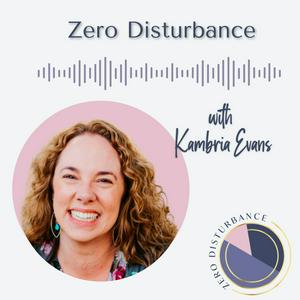93: The Blueprint for Women in Therapy [Why Women Go To Therapy Series]
Ever felt like you’re giving so much to others that you forget to take care of you? You're not alone.
In this episode of the Zero Disturbance podcast, Kambria Evans shines a light on why so many women seek therapy—and it’s not because something’s “wrong” with us. It’s because we’ve been conditioned to ignore our own internal signals for far too long.
In this eye-opening conversation, come learn why women often feel disconnected from our emotions, bodies, and true selves. From a young age, we’re taught to prioritize external validation and caregiving, leading us to lose touch with our inner needs and desires. This can leave us feeling out of sync with our own power, even as we continue to give to others.
But here’s the truth: women's therapy shouldn't be about fixing an internal problem —it’s about reconnecting with our inner wisdom. We call for an updated approach to women's therapy—one that goes beyond the traditional labels and diagnoses. Instead, it’s all about tuning into your body, emotions, and intuition to rebuild trust in yourself.
This isn’t just theory—it’s a call to action. This approach empowers women to trust their inner safety systems, make decisions that honor their well-being, and live in alignment with their truest selves. So, if you’re ready to hear how therapy can be the ultimate tool for self-empowerment, check out this game-changing episode. The insight will inspire you to reconnect with the most important person in your life: YOU.
The Zero Disturbance podcast is for educational purposes and is not a replacement for a therapeutic relationship or individualized mental health or medical care.
What You’ll Learn:
1. The foundational reasons why women seek therapy, emphasizing the importance of internal safety systems, self-attachment, and emotional connection.
2. How women are often taught from an early age to focus on external validation and caregiving, which can lead to a disconnection from their own internal needs, emotions, and bodies.
3. Women eventually come to therapy seeking to understand who they truly are and what their purpose is—questions that should ideally be explored throughout their lives but are often neglected due to societal conditioning.
4. It's time for an updated approach to women's therapy, one that goes beyond traditional diagnoses like those found in the DSM, which often pathologize emotions and experiences instead of seeing them as important information.
5. Therapists, it's your job to help women reconnect with their internal safety systems—tuning into their emotions, body sensations, and intuitive responses. These connections, when nurtured, empower women to trust their inner wisdom and make decisions that prioritize their well-being, safety, and peace.
Come learn with us at Zero Disturbance:
Want to learn more about empowering yourself to experience therapy or coaching on your terms? If you appreciated this episode, you wont want to miss out on The Client Workbook + supporting videos!
We also offer free resources for clients and therapists! Get access to our free client resource library for the most up-to-date tools and resources for your own journey.
Therapists, access our favorite free resources for designing high-value offers in The Zero Disturbance Welcome Bundle.
With a Masters in Education from Vanderbilt, Kambria has been creating trainings and teaching adult learners for over 20 years. As the Director of Education and Quality Improvement at Stanford Medical School, she created ease in complex systems, thereby giving medical trainees successful learning experiences. Now, as a dedicated mom, therapist, and EMDR Consultant, Kambria knows what it means to do things efficiently, effectively, and in a learner-centered way. When she isn't podcasting or creating online courses, you can find Kambria playing with her twins on a beach in California.

